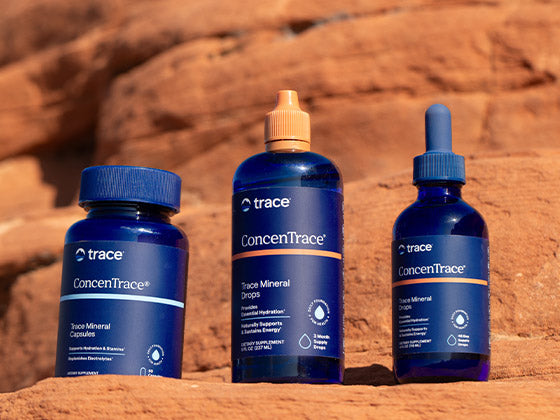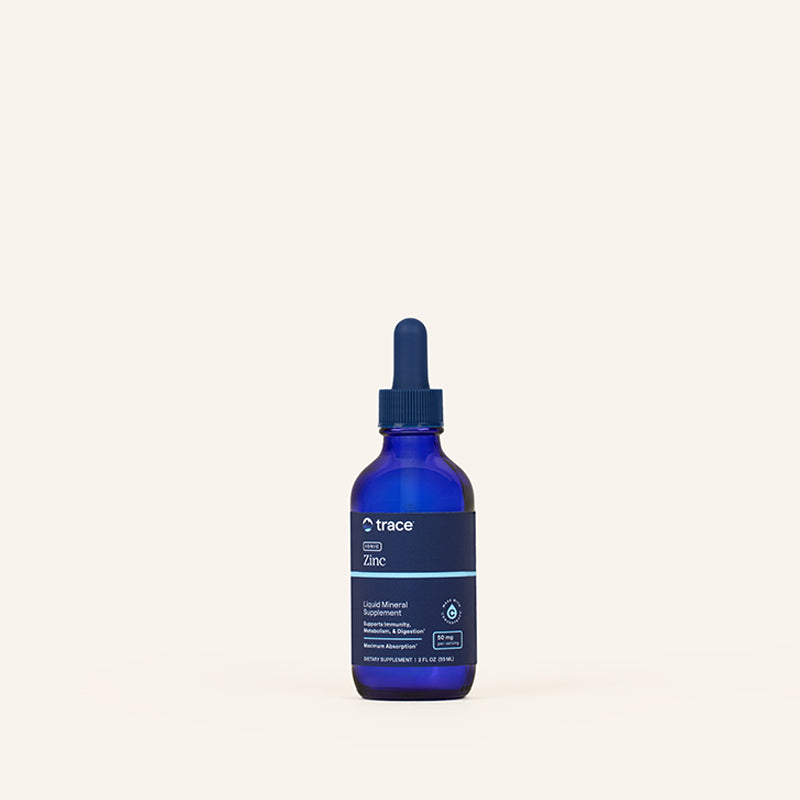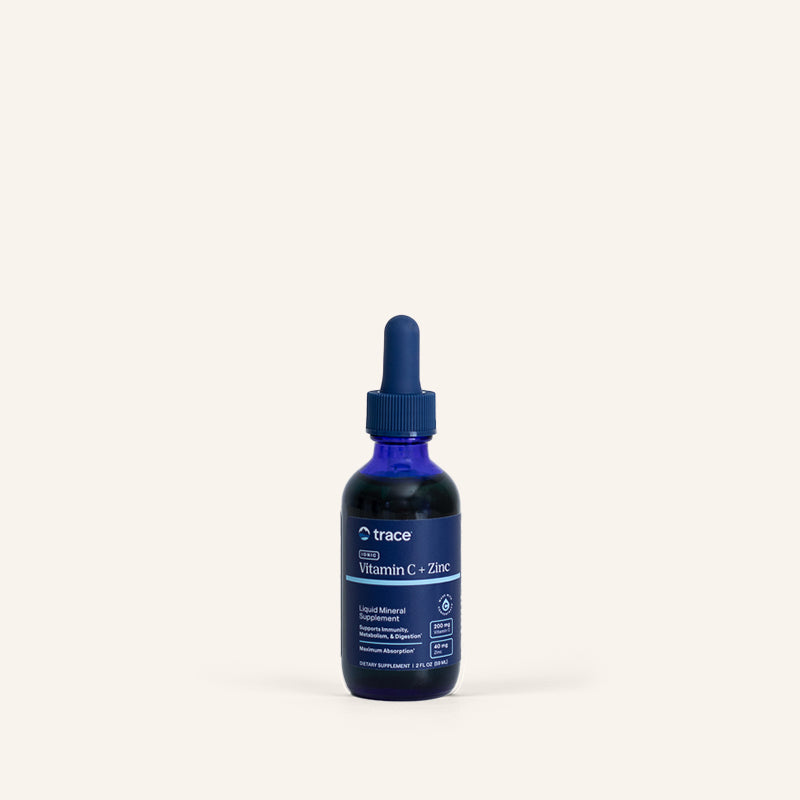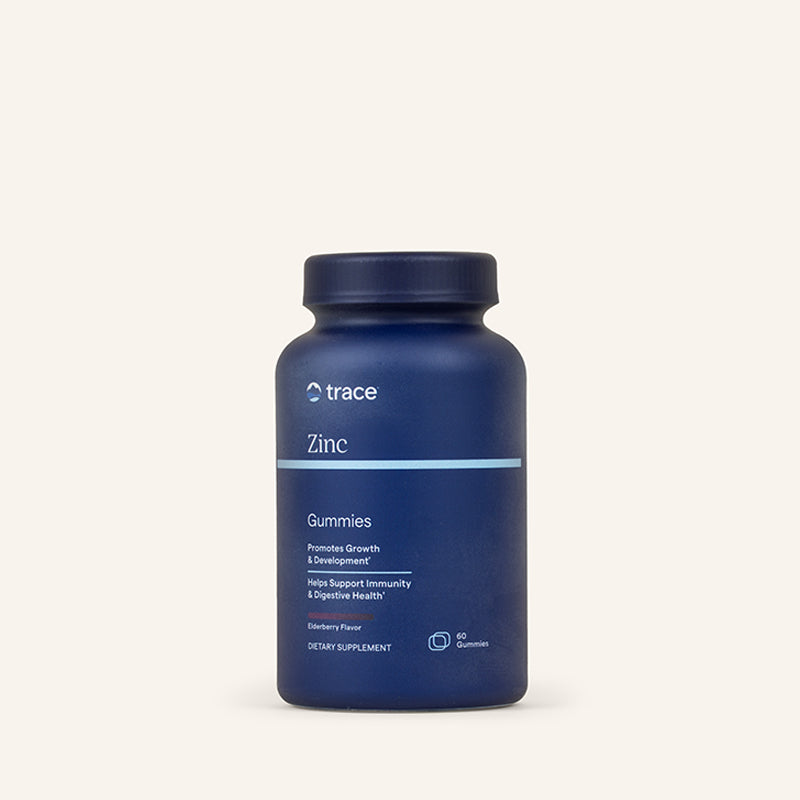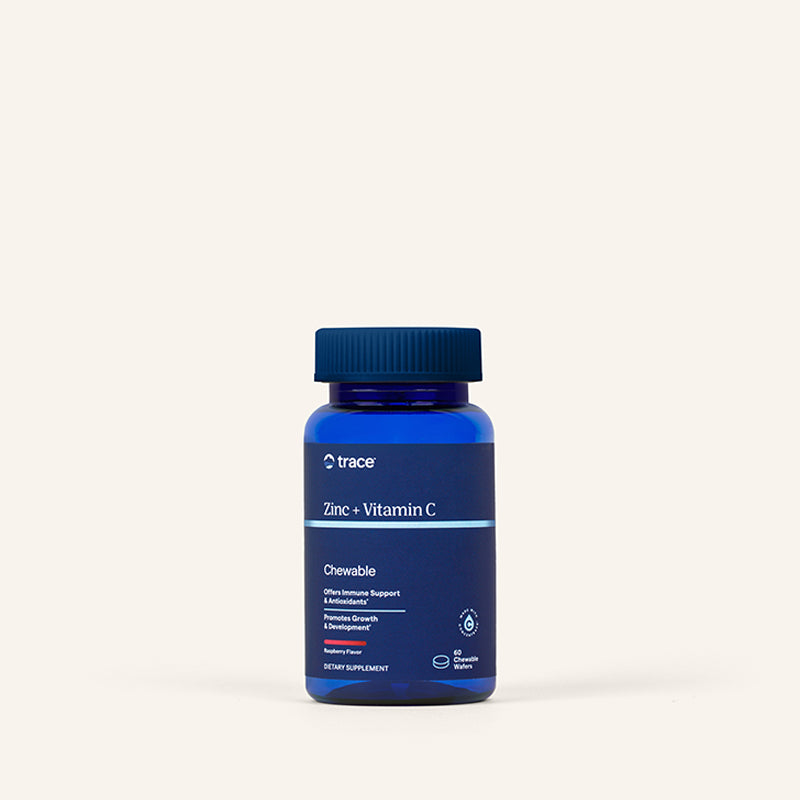Zinc For Colds
At Trace Minerals, we have spent over five decades perfecting mineral supplementation. Our commitment to purity, science-backed formulations, and sustainable sourcing ensures that every product delivers superior benefits. Trusted by health professionals and backed by third-party testing, Trace provides the highest-quality minerals to help you achieve optimal health and vitality.
Filters
Filters
How Zinc Supports The Immune System
Zinc is an essential trace mineral that is pivotal in maintaining immune function. But does Zinc help with colds? Let’s explore.
Zinc’s Role In Immune Cell Development
Zinc is an essential trace mineral that is pivotal in maintaining immune function. As a key component in many enzymatic reactions, zinc is vital for the development and function of immune cells. It acts as a catalyst for producing proteins associated with the immune response, enhancing the body's ability to fend off invaders such as bacteria and viruses.
Regulating The Immune Response And Inflammation
Zinc is particularly noteworthy in the context of colds. It contributes to the production and regulation of cytokines—proteins that signal immune responses. By optimizing these responses, zinc helps moderate inflammation and ensure that the immune system acts efficiently without overreacting. This balance is crucial in common colds, where the body needs to respond to viral infections effectively while minimizing excessive inflammation.
Zinc As A Natural Antiviral Agent
Zinc also acts as a direct antiviral agent. It has been shown to inhibit the replication of viruses, particularly those responsible for the common cold. By disrupting the ability of these pathogens to reproduce and spread, zinc supplements can reduce the duration and severity of cold symptoms.
Boost your immune system with the power of zinc. Trace offers premium, science-backed zinc supplements designed for optimal absorption and effectiveness. Whether you want to strengthen immunity, reduce cold symptoms, or enhance overall well-being, our sustainably sourced and third-party tested formulas can help. Prioritize your health with Trace’s trusted mineral supplementation.
Optimal Zinc Dosages For Cold Prevention And Treatment
When considering zinc supplementation for cold prevention and treatment, it’s vital to focus on the correct dosages to maximize effectiveness and ensure safety. Zinc, a trace mineral, plays a crucial role in immune function, making it a popular choice in addressing common cold symptoms.
But how much zinc is optimal?
- Zinc For Cold Prevention: Research suggests that a daily intake of 15 to 25 milligrams of zinc is often recommended for cold prevention. This intake level supports the immune system and helps maintain overall well-being, reducing the likelihood of catching common viral infections.
- Zinc For Cold Treatment: Higher doses, typically ranging from 50 to 75 milligrams per day, are usually suggested at the onset of cold symptoms. These higher doses should only be taken for short periods, such as during a cold, to avoid potential side effects from excessive zinc intake, such as nausea or reduced copper absorption.
- Enhancing Zinc Absorption With ConcenTrace: At Trace, we recognize the importance of achieving mineral balance, including zinc. Our products incorporate ConcenTrace to enhance nutrient absorption, ensuring you receive the essential minerals your body requires efficiently. This means better bioavailability and effectiveness in supporting immune function.
- Safe Supplementation Practices: When integrating zinc into your routine, it is imperative to follow recommended dosages and consult with health professionals, particularly if you are considering higher doses for therapeutic purposes.
Our dedication at Trace is to provide concentrated, responsibly sourced minerals that support your health. Sourced from the naturally mineral-rich Great Salt Lake, our products are developed under rigorous scientific standards. Trust us to help guide you in remineralizing your body so you can function at your best and feel the difference.
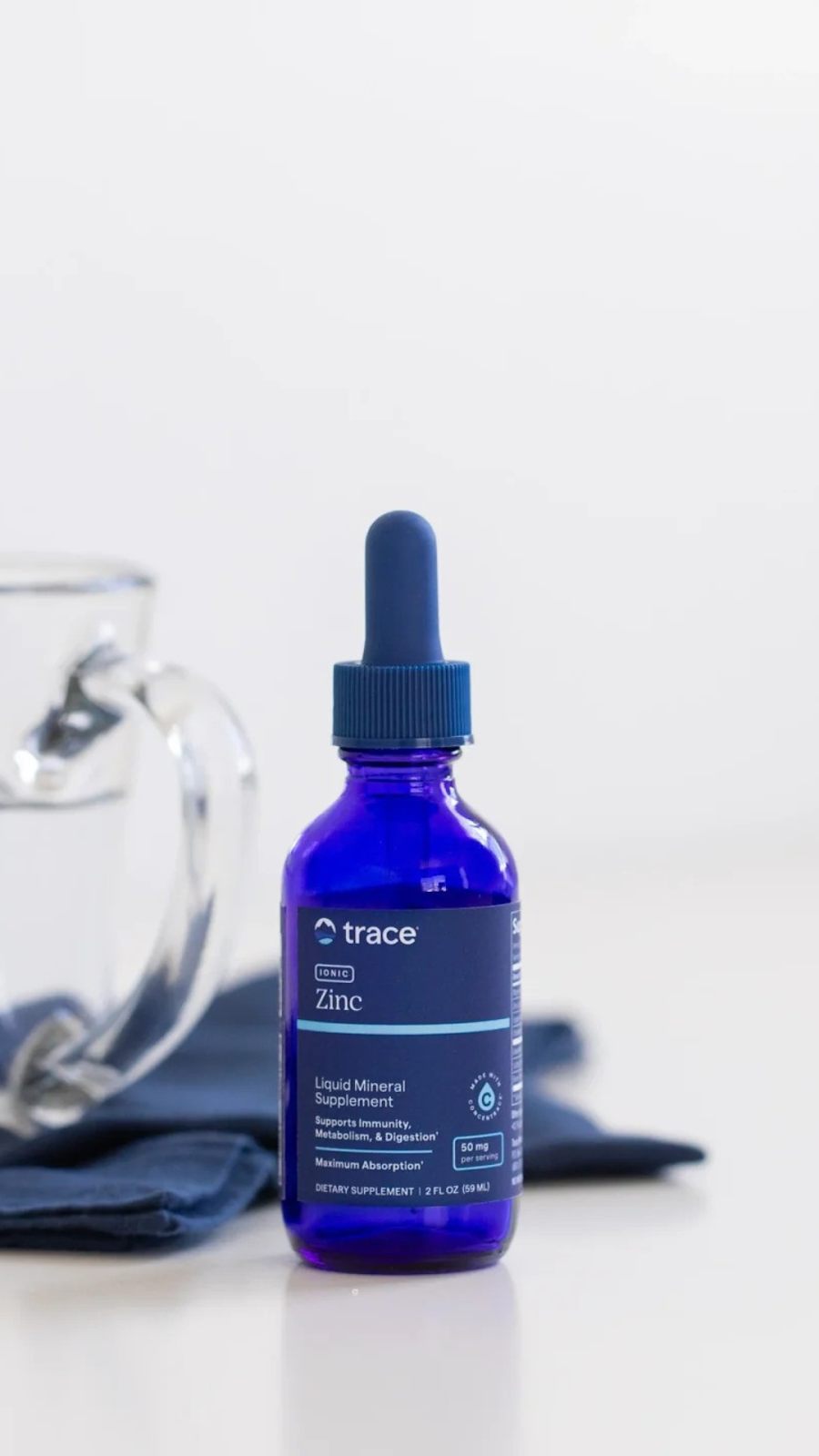
Choosing The Right Zinc Supplement For You
When selecting a zinc supplement, there are a few critical considerations to ensure you receive the right dosage and optimal absorption. Zinc is a powerful mineral renowned for its role in immune function and overall health. Incorporating it into your daily regimen could help you combat colds and enjoy a stronger immune defense.
- Formulation Matters: Zinc supplements are available in various forms, including zinc gluconate, zinc citrate, and zinc picolinate. Each has different absorption rates and bioavailability. Our ionic zinc with vitamin C offers synergistic benefits, ensuring that your body effectively absorbs and utilizes the zinc you take.
- Dosage and Frequency: It's important to observe recommended daily values and personalize them according to your needs. Some may require higher doses temporarily during cold symptoms, while others might benefit from a lower, consistent intake.
- Ingredient Synergy: Consider supplements that incorporate additional trace minerals. At Trace, our unique combination of ConcenTrace and zinc provides a holistic approach to remineralization, helping you achieve maximum health benefits. Our products supply zinc and a spectrum of essential minerals that work synergistically.
- Source and Sustainability: The origin of the minerals in your supplement can greatly affect its quality. Our commitment at Trace to sustainable sourcing means you receive the highest-quality minerals from the Great Salt Lake, promoting your health and the environment's well-being.
Choosing the right zinc supplement is an empowering step in your wellness journey. With our scientifically backed formulations, you can take comfort in supporting your body's intricate needs with care and excellence.
Comparing Zinc Sources: Supplements, Foods, And Trace Minerals
When battling a cold, the source of your zinc can play a crucial role in how effective it is in supporting your immune system. Let's explore how you can incorporate zinc into your diet and lifestyle, focusing on supplements, foods, and trace minerals.
Supplements
Zinc supplements are popular for those looking to ensure adequate zinc intake, especially during a cold. They come in various forms, including zinc gluconate, zinc acetate, and zinc sulfate, differing in absorption rates and efficacy. These supplements are often available in tablets, capsules, or lozenges, providing a convenient way to boost zinc levels quickly and efficiently. As with any supplement, choosing high-quality products that prioritize safety and effectiveness is essential.
Zinc Rich Foods
Integrating zinc-rich foods into your meals is a natural way to maintain optimal zinc levels. Foods like oysters, red meat, poultry, beans, nuts, and whole grains are excellent sources of zinc. These foods offer zinc and provide a spectrum of other nutrients that can support your overall health. Eating a balanced diet rich in zinc-containing foods can help fortify your body's defenses against colds and other illnesses.
Zinc From Trace Minerals
At Trace Minerals, we offer a unique and natural source of zinc and other essential minerals harvested sustainably from mineral-rich waters such as the Great Salt Lake. These trace minerals work synergistically with your body’s systems, enhancing nutrient absorption and offering a holistic approach to remineralization. By incorporating trace mineral products like ConcenTrace into your daily regimen, you ensure that your body gets zinc and a balanced blend of other vital minerals needed for optimal health.
Trace Minerals And Their Role In Fighting Infections
Trace minerals are vital micronutrients that serve as the essential building blocks for maintaining optimal health and wellness. At Trace, we emphasize the importance of these minerals to help support the immune system and enhance the body's natural defense mechanisms, particularly in combating infections such as the common cold.
- Supporting Immune Cell Function: Trace minerals such as zinc, selenium, magnesium, and iron play a critical role in the development and activation of immune cells. Zinc is essential for producing T-cells and white blood cells, which help identify and eliminate harmful pathogens before they can cause infections.
- Enhancing Antiviral and Antibacterial Defenses: Zinc and selenium have been shown to possess antiviral properties, helping to prevent viruses from replicating within the body. Similarly, copper and iron contribute to antibacterial defenses by supporting the body's natural production of enzymes that neutralize harmful bacteria and maintain a healthy immune response.
- Reducing Inflammation and Oxidative Stress: Inflammation is a natural immune response, but chronic inflammation can weaken immunity over time. Magnesium and selenium regulate inflammation by reducing oxidative stress and promoting a balanced immune response. This can help the body fight infections more efficiently without causing excessive damage to healthy tissues.
- Boosting Antibody Production: Antibodies are proteins that help the immune system recognize and fight off infections. Zinc and iodine are essential in producing these antibodies, ensuring the body has a strong defense against future infections. Without sufficient levels of these minerals, the immune system may struggle to respond adequately to pathogens.
- Promoting Faster Recovery From Illness: Proper mineral balance contributes to faster recovery by supporting the body's natural healing processes. Zinc, magnesium, and selenium assist in tissue repair and immune modulation, helping the body recover from infections more quickly and effectively.
At Trace, we understand that mineral deficiency can compromise immune function, making the body more susceptible to infections. Our carefully formulated mineral supplements provide essential trace minerals in bioavailable forms, ensuring optimal absorption and immune support.
Read also:
- How Zinc Can Help Fight Acne And Promote Clear Skin
- Zinc Benefits: Supporting Immunity And Overall Health
- How Much Zinc Does A Woman Need Daily?
Sources:
1. Wessels, I., Maywald, M., & Rink, L. (2017). Zinc as a Gatekeeper of Immune Function. Nutrients, 9(12), 1286. https://doi.org/10.3390/nu9121286
2. Gammoh, N. Z., & Rink, L. (2017). Zinc in Infection and Inflammation. Nutrients, 9(6), 624. https://doi.org/10.3390/nu9060624
3. Read, S. A., Obeid, S., Ahlenstiel, C., & Ahlenstiel, G. (2019). The Role of Zinc in Antiviral Immunity. Advances in nutrition (Bethesda, Md.), 10(4), 696–710. https://doi.org/10.1093/advances/nmz013
4. Huang, Z., Rose, A. H., & Hoffmann, P. R. (2012). The role of selenium in inflammation and immunity: from molecular mechanisms to therapeutic opportunities. Antioxidants & redox signaling, 16(7), 705–743. https://doi.org/10.1089/ars.2011.4145
5. Parkin, J., & Cohen, B. (2001). An overview of the immune system. Lancet (London, England), 357(9270), 1777–1789. https://doi.org/10.1016/S0140-6736(00)04904-7
Frequently Asked Questions
Zinc is a vital mineral essential in numerous bodily functions, including immune system support, DNA synthesis, and cell division. It is a crucial component for maintaining overall health and well-being.
While zinc cannot completely prevent the onset of cold, scientific studies, suggest that it can reduce the severity and duration of cold symptoms shortly after they begin.
For optimal results against colds, zinc should be taken in lozenge form or as a syrup within 24 hours of the first symptoms. As far as how much zinc you should take for a cold, it's important to follow recommended dosage guidelines to ensure effectiveness and safety.
Zinc is naturally present in many foods, including red meat, poultry, shellfish, beans, nuts, and whole grains. High-quality zinc supplements, like Trace's ConcenTrace-enhanced products, can effectively boost zinc intake for those needing concentrated sources.
Zinc supplements are generally safe when taken as directed. However, excessive zinc intake can lead to adverse effects. It's essential to adhere to recommended dosages and consult a healthcare provider if you have underlying health conditions.
The appropriate dosage of zinc for treating a cold can vary. Generally, taking 15-30 mg of zinc daily is recommended during a cold's acute phase. Always follow the product's label instructions or seek advice from a healthcare professional before starting supplementation.
